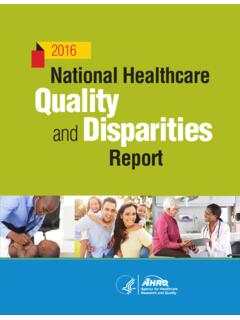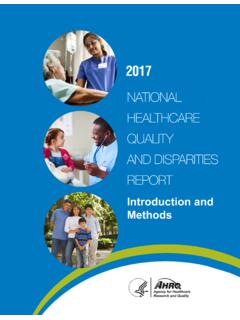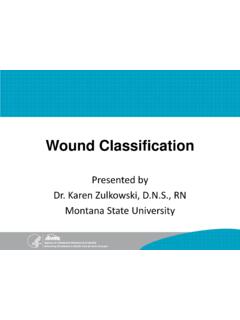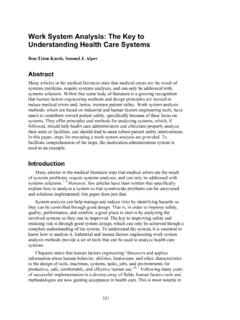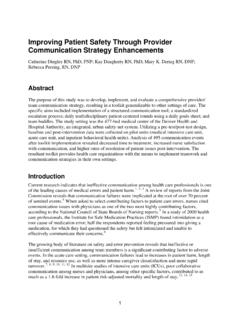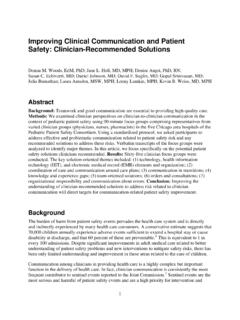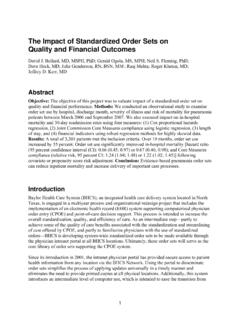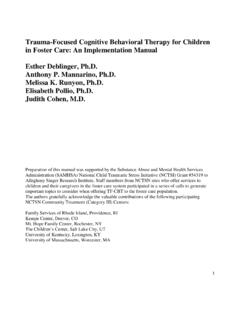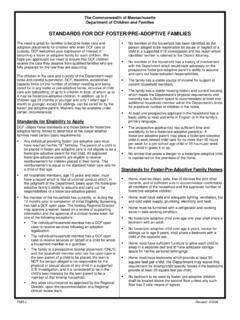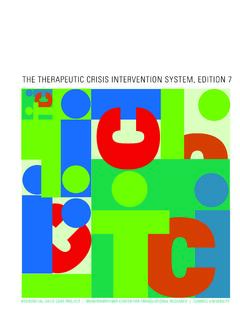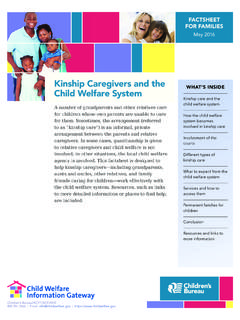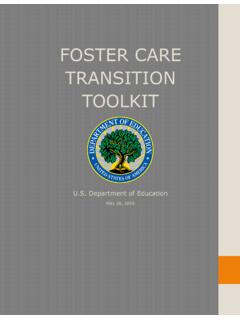Transcription of Mental Health Problems in Foster Care Children
1 Mental Health Problems in Treatment for Mental Health Problems can include: Foster care Children Nonmedicine therapies MORE THAN 400,000 Children IN THE UNITED STATES LIVE IN (such as psychotherapy, . Foster care . Many come from unstable families or have or talk therapy), been abused or neglected. As a result, Foster Children may OR . be more likely to have a Mental Health problem . If you care Psychotropic . (pronounced SIE-kuh . for a Foster child and think he or she may have a Mental TROE-pic) medicine, Health problem , you may want to talk with your child's OR . doctor to see if treatment is needed.*. A combination of the two Best Practices for Treating Mental Health Problems in Foster Children In September 2013, the State of Texas released a best practices.
2 Guide for doctors who prescribe psychotropic medicines to Foster Children . The guide can be useful to doctors in any State who treat Foster Children who have Mental Health Problems . The use of psychotropic medicines to treat Children with Mental Health Problems is an important issue facing parents, caregivers, and doctors. Because of the emotional and Mental stress that Foster Children often experience, it is an especially important issue for Foster parents. The best practices guide can help doctors, Foster parents, and other caregivers better Psychotropic medicines understand the proper use of psychotropic medicines in (medicines for Mental or Foster Children .)
3 Emotional conditions). If you have a [ Foster ] child with Mental Health Problems , the affect the ways in which information in this handout can help you prepare for doctor chemicals that naturally visits and make decisions about treating your child. occur in the brain interact. * In the State of Texas, only designated Medical Consenters can give a Health care provider informed These medicines need to consent (written permission) to treat a Foster child. This may be different in your State. This summary refers to Foster parents' and caregivers', but Medical Consenters in the State of Texas may also include be carefully prescribed case managers for child placing agencies, professional staff of emergency shelters, cottage parents, and closely watched relative and kinship caregivers, and certain Department of Family and Protective Services staff and youth medical consenters.
4 Visit your State's department of family and protective services Web site for by a doctor. more information on who can give informed consent to treat a Foster child. P R E PA R I N G F O R T H E If Your Doctor Wants To Treat Your Foster Child for a FIRST DOC TOR VISIT Mental Health problem When taking your Foster child to a The best practices guide recommends that your doctor do a doctor for the first time about his or her full exam before prescribing a medicine for your child's Mental Mental Health Problems , the doctor Health problem . Unless it is an emergency , the doctor may may want to talk to you about: follow these steps: J Your child's complete Health history, J Carefully go over your child's Health history if records are if you have this information available (noting any trauma your child has had).
5 J Your child's history of trauma J Do a psychosocial assessment (physical and emotional), if you Do a Mental exam have this information J. J Your child's symptoms. If you can J Do a physical exam keep a record of the symptoms, it J Give a diagnosis may include: J Consider nonmedicine therapy as part of the treatment plan A list of the symptoms, when each symptom started, how Make sure your doctor discusses these things with you before often the symptoms happen, and you give your written permission: when they flare up or get worse J Your child's diagnosis Any traumatic events that J The results of any lab tests happened right before the J Possible benefits and risks of treatment symptoms started or got worse J Possible side effects of the medicine, including less common but possibly severe side effects such as seizures or life- threatening allergic reactions J The risks of no treatment If your doctor prescribes a psychotropic medicine, usually your doctor should.
6 J Start with only one medicine before adding any more J Start with a low dose (amount of medicine) and carefully raise the dose if needed J Only change one medicine at a time J Stop a medicine that is not working before trying a different medicine . An emergency situation may consist of: thoughts about suicide, psychosis (severe Mental illness), self-injuring behavior (like cutting), aggressive behavior that is dangerous to others, or impulsive behavior that endangers your child or others;. Problems with Mental and physical functioning (such as not eating or sleeping);. or when your child has severe anxiety, isolates himself or herself from others, or withdraws from his or her usual activities.
7 Making a Treatment Decision If your doctor recommends that your Foster child be treated for his or her Mental Health Problems , your doctor may explain which symptoms will be treated and what to expect from the treatment. You and your doctor can carefully weigh the possible benefits and risks of taking a psychotropic medicine. Both you and your Foster child can help make all treatment decisions if he or she is mature enough to participate. These are examples of questions you can ask your doctor so that you can be involved in the Before your doctor can give your decision making process: Foster child any psychotropic J What treatment do you think would be medicine, you, or the child's best for my child?
8 Are there any other treatment options? appointed Medical Consenter J What are the results that you expect from (see page 1 for more details). treatment? must give informed consent . J What are the possible benefits and risks of (written permission). treatment? What are the risks of no treatment? J If you think my child needs a medicine, which one? Followup care for Your Foster Child J Are there any nonmedicine treatments we could try before or along with the medicine? If your doctor started your child on a Mental Health treatment, the best practices guide J What are the possible side effects of the recommends that your child go to the doctor psychotropic medicine?
9 Are there any possible at least once every 3 months. At each visit, the serious side effects to watch for? What should I. doctor may: do if a serious side effect appears? J Review your child's symptoms J How long will it take for the treatment to J Check to see how well the treatment is working start working? J Make sure the treatment is having the J How will we know if the treatment is working? desired effects J What will we do if my child's symptoms do not J Make note of any side effects from the get better or if they get worse? medicines J How often should we come see you to J Especially watch for signs that your child is monitor progress?
10 Having suicidal thoughts J What else can I do to help my child? J Check your child's weight, height, and blood pressure J If your child is taking antipsychotic medicines, check his or her blood sugar and cholesterol (a type of fat in the blood). OT H E R R E S O U R C E S. A number of trusted Web sites provide Psychotherapy and Medicines for JJ Choosing the Right Treatment: resources about treating Children Mental Health Problems What Families Need to Know About with Mental Health Problems . These Evidence-Based Practices, a booklet JJPsychotherapies, a Web page from the resources are listed below. from the National Alliance on Mental National Institute of Mental Health .
